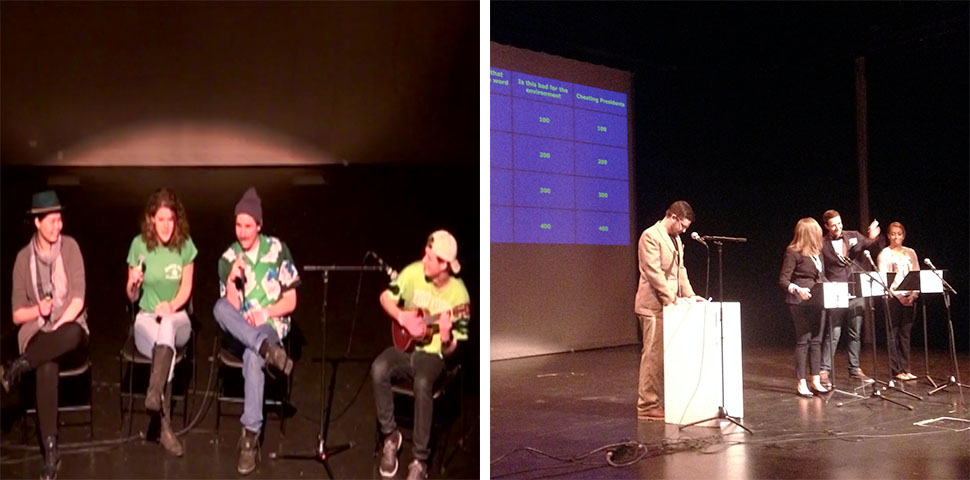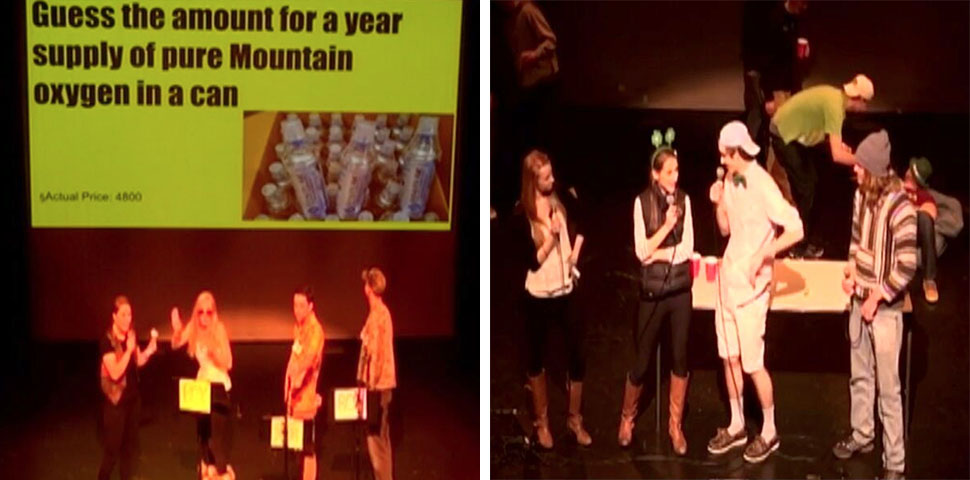An Experimental Evening of ‘Comedy for Climate Change’
by:
This Spring, in our Inside the Greenhouse ‘creative climate communications’ course we conducted an experiment. We challenged forty senior undergraduate students to come up with a comedy skit or standup routine that drew on issues associated with climate change…a we gave them a mere four weeks from start to finish (the finish being a live comedy show on campus).
Though a bit bewildered at the prospect of such an unusual assignment, every student courageously embarked on the challenge. In groups of four, they quickly got to work on a composition.
While some found quick inspiration, most of the students understandably struggled with various elements of the task at hand. Early comments included, "you're telling us to take something really serious and make it funny - that is very difficult", and “I’m just not very funny – why would I want to show that off?”. But to their credit, drawing inspiration from class exercises/activities and visiting speakers (including Prof Max Liboiron [Memorial University of Newfoundland], Prof Peter McGraw [University of Colorado-Boulder], Dave Poulson [Michigan State University], and Josh Rollins) students began to find some traction and satisfaction from their sustained efforts to find the funny in climate change.
As part of the creative process, each group were asked to state what their main communication/climate message(s) is/are.
Here are some examples:
- “Don’t let economic or religious beliefs interfere with environmental priorities”
- “We point out the ridiculousness of climate change and human error while attempting to deliver a message of the need for change”
- “Be aware of your environmental impacts and don’t be hypocritical. If you talk the talk, then walk the walk and know how to do it effectively”
- “Climate change…can be framed as a relatable subject and doesn’t have to be a daunting doomsday problem”
After a month of hard work and rehearsals, it was show time. So on a cold and snowy St Patrick’s Day evening (which we learned was considered as a quasi-religious University student holiday), about seventy-five attendees joined the performers as they packed into the CU Boulder Atlas Institute Black Box theatre for an experimental evening of ‘Comedy for Climate Change’.
In addition to the live performances, the winners of the first ‘Inside the Greenhouse comedy and climate change short video competition’ were announced and their videos were shown, and additional ‘talent’ from across CU Boulder took part in the event.
On the night, the skits and stand-up comedy routines were performed with bravery. Based on positive audience feedback, these acts were digested with great effect. In the spirit of finding ways to connect with different audiences to make climate change more relevant and meaningful through humor, the participants communicated serious messages about climate change using the resonant vehicle of comedy to take it there.

When we embarked on this experimental challenge mixing comedy with climate change, we recognized the risks of trivializing a critically important issue. We also carefully considered the elements of audience and context. Through the process – and products in the show – the experiment was seen to largely be a success.

Students (representing seven majors on campus: Environmental Studies, Geography, Ecology and Evolutionary Biology, Communications, English, Theater, Psychology) later shared their reflections. These included:
- “Never in my whole life have I been so nervous and stressed out for a school project…and yet, I’ve never walked away from a presentation or in a class event feeling as proud of myself as I did [that] night…”
- it helped me “not only become a better climate communicator, but also built my confidence in the academic and social realms”.
- “this composition has given me more confidence to speak in front of a group or an audience…and it has made me think more abstractly about ways to tackle a complex problem, and that thinking outside the box may generate helpful solutions”
- “In the realm of comedy and satire, it seems that regardless of your personal biases or political affiliations, anyone who doesn’t take themselves too seriously can participate and appreciate the art form. In other words, the approachability of humor transcends otherwise uncircumventable barriers because of the humble pretense that funny is funny”
- “It showed me how fun climate communication can be, which helps to reframe the whole conversation in a way that feels more manageable”
- “The composition helped me by enabling me to talk about very serious issues in not such a ‘doom and gloom’ type of way, while still communicating the seriousness of the issue”
- “This helped my climate communication skills by combining the laughter of comedy with the seriousness of climate change. By doing this, it is easier to bring up the subject of climate change without being depressing”
While process here was as important as products, the products-as-performances can be seen on our site here.
